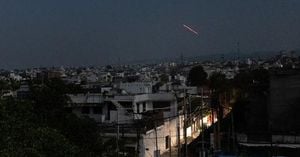Filmmaker Anurag Kashyap has voiced his frustration over the censorship issues surrounding the biographical drama Phule, directed by Ananth Mahadevan. The film, which stars Pratik Gandhi as Jyotirao Phule and Patralekhaa as Savitribai Phule, was initially slated for release on April 11, 2025, coinciding with Mahatma Jyotirao Phule's birth anniversary. However, the release has now been postponed to April 25, 2025, following objections raised by a section of the Brahmin community in Maharashtra.
Kashyap took to Instagram to express his concerns, questioning the very existence of casteism in India. He remarked, “Bhai mil ke decide kar lo. India mein casteism hai ya nahi…” (Brother, let’s decide together. Does casteism exist in India or not?). His comments highlight the contradiction in the community's objections, particularly in light of claims made by political figures regarding the eradication of the caste system.
The controversy erupted after the Central Board of Film Certification (CBFC) granted Phule a ‘U’ certificate on April 7, 2025, but demanded several edits before its release. These edits included the removal of terms such as 'Mang', 'Mahar', and 'Peshwai', as well as modifying the phrase “3,000 saal purani ghulami” to “kai saal purani ghulami.” Despite complying with these requirements, the film faced backlash from the Brahmin community, who claimed misrepresentation.
Kashyap criticized the CBFC for what he described as a “rigged system,” questioning how groups protesting films gain access to content before its official release. He stated, “How do these wings and groups see the film before its release? Unless someone’s giving them access. The whole system is rigged.” This sentiment echoes a broader concern among filmmakers about censorship in India, particularly for films that tackle sensitive social issues.
The film Phule aims to shed light on the lives and contributions of Jyotirao and Savitribai Phule, who were pivotal figures in the fight against caste discrimination and for women's education in India. Ananth Mahadevan, the film's director, expressed disappointment over the objections, suggesting that the Brahmin community's reaction was a knee-jerk response to the film's trailer. He stated, “They probably thought that we had maligned Brahmins, but there is a strong bond between Brahmins and Jyotirao Phule in the film.”
In a further critique of the Brahmin community's objections, Kashyap pointed out the irony of their outrage. He asked, “If casteism didn’t exist in this country, why would they have needed to fight against it?” This question not only challenges the validity of the community's complaints but also calls into question the broader societal acknowledgment of caste issues.
During the screening of another film, Dhadak 2, the CBFC reportedly stated that Prime Minister Modi had eradicated the caste system in India. Kashyap referenced this during his Instagram posts, questioning, “If there’s no caste system, why are Brahmins upset over Phule? Who are you if caste doesn’t exist? Why are you burning with anger?” His remarks resonate with many who feel that caste discrimination remains a pressing issue in contemporary India.
In addition to Kashyap's comments, other filmmakers have also spoken out against the censorship faced by films like Phule. Anubhav Sinha, another prominent director, questioned the double standards present in political discourse versus cinema, stating, “Why should only cinema lie?” This highlights a growing frustration among artists regarding the limitations placed on creative expression.
The film’s release has now been delayed to April 25, 2025, and it remains to be seen how the controversy will impact its reception. Prakash Ambedkar, president of the Vanchit Bahujan Aaghadi, has staged protests in Pune, arguing that removing crucial scenes would strip the film of its intended message. He stated, “If those scenes are removed from Phule, the purpose of the film is lost.”
As the release date approaches, the ongoing debate surrounding Phule raises important questions about the representation of caste in Indian cinema and the societal implications of censorship. The film not only tells the story of two significant historical figures but also serves as a contemporary commentary on the challenges that remain in addressing caste discrimination in modern India.
In conclusion, the controversy surrounding Phule reflects broader tensions within Indian society regarding caste, representation, and artistic freedom. Anurag Kashyap’s outspoken critique of the CBFC and the Brahmin community underscores the need for open dialogue about these issues, as well as the importance of allowing filmmakers to explore complex social narratives without fear of censorship.










